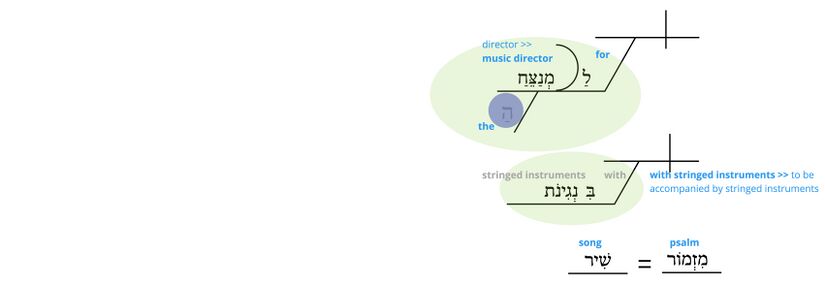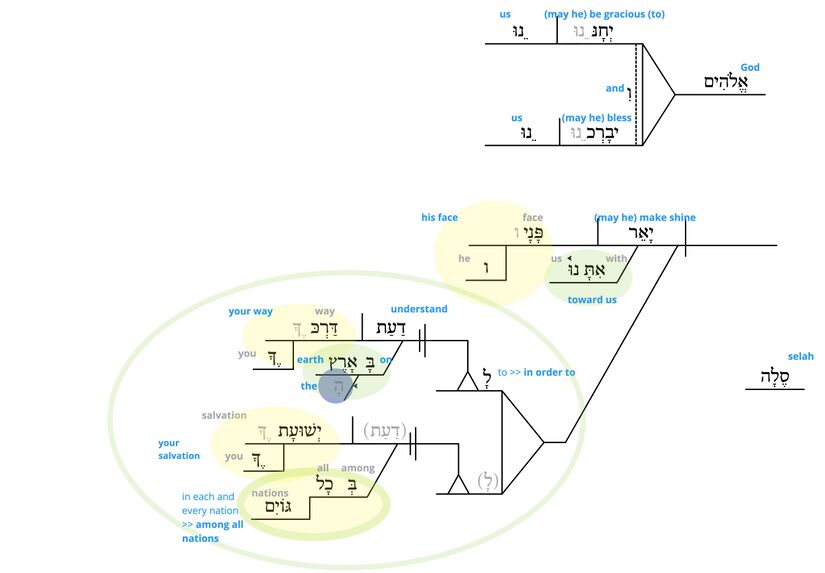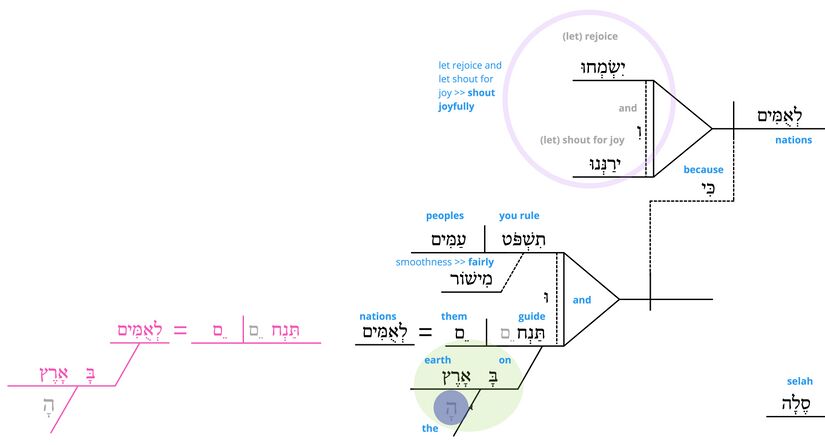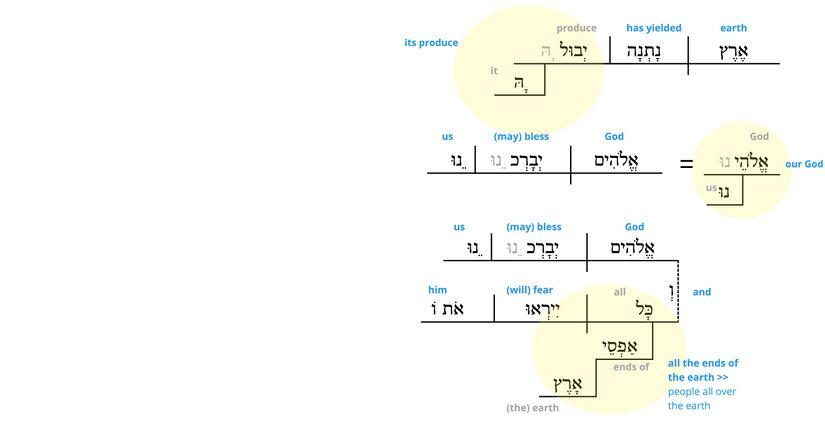Psalm 67 Verse-by-Verse: Difference between revisions
No edit summary |
No edit summary |
||
| Line 46: | Line 46: | ||
*The use of "'''toward'''" for the preposition אִתָּ֣נוּ helpfully brings out the component of relationship, the sense of affection brought out by SDBH. Another option could be "upon."<ref>Waltke & O'Connor (11.2.4a #7) specifically suggest "toward us" for this passage, as the "complement of verbs of dealing, speaking, and making."</ref> In any case, the construction used here in Psalm 67 seems to match the meaning of the preposition אל used in Numbers 6:25-26. | *The use of "'''toward'''" for the preposition אִתָּ֣נוּ helpfully brings out the component of relationship, the sense of affection brought out by SDBH. Another option could be "upon."<ref>Waltke & O'Connor (11.2.4a #7) specifically suggest "toward us" for this passage, as the "complement of verbs of dealing, speaking, and making."</ref> In any case, the construction used here in Psalm 67 seems to match the meaning of the preposition אל used in Numbers 6:25-26. | ||
====Notes on Verse 3==== | ====Notes on Verse 3==== | ||
* | *Verse 3 shifts from language of the Aaronic blessing, as found in verse 2, to language of the '''Abrahamic blessing''', not only in semantic content,<ref>The first iteration of this promise, in Genesis 12:1-3, contains many overlapping terms with Psalm 67:3, while other statements of this promise (Genesis 18:18, 22:18, and Genesis 26:4) use “all nations (goy) of the earth (eretz),” thereby increasing the connections with this verse.</ref> but also in the use of the 2nd-person pronominal suffix.<ref>Genesis 12:1-3 is full of 2nd-person pronominal suffixes as the Lord speaks to Abraham; verse of Psalm 67 suddenly shifts into 2nd person with two pronominal suffixes as Abraham's descendants speak directly to Him.</ref> See the [NEED LINK] Surprise! Poetic Feature for more details. | ||
*The prefix ל opening the verse is one of purpose, "in order.” The subject may be understood as “those on earth.” See [[The Grammar and Meaning of Ps. 67:3]] for a more extensive discussion of the intricacies of this verse. Note that the infinitive לָדַ֣עַת ‘to understand’ has been elided in the second clause of verse 3, but applies to both clauses. (https://psalms.cdbr.org/w/The_Grammar_and_Meaning_of_Ps._67:3) | |||
*'''Earth''' here refers to the whole world. It is possible the word also suggests a double entendre with the land of Israel. In fact, it's likely that the author has encoded some intentional ambiguity here, since the blessing on "our land" will be turned into blessing for the whole earth. See [NEED LINK] the What on Earth? Poetic Feature for more insights into the word ‘earth’ as used throughout Psalm 67. | |||
*Note the unconventional word order in both 3a and 3b, where the prepositional phrase appears before the object. A similar word order appears in 5c, where the prepositional phrase appears before the verb. | |||
*God’s '''way''' may be understood as his characteristic activity (e.g., Psalm 103:7) and his mighty acts.<ref>Brown, Seeing the Psalms 2002:43</ref> God often “makes known” his way to Israel (e.g., Exodus 18:20, when he gives the Torah; Exodus 33:13, where Moses asks God to teach him his way; Jeremiah 5:4, where Israel is accused of not knowing God’s way). Here he makes it known not only to Israel but also to the nations! It was known that foreigners would be drawn to him when they heard about his deeds (e.g., 1 Kings 8:41-43). | |||
*God’s '''salvation''' represents security, including protection, success, and deliverance<ref>SDBH</ref>, suggesting that those under his care will not come into harm, ruin, or loss. | |||
*Applied to a plural and indefinite noun, '''all''' (כֹּל) here might also be phrased ‘each and every one.’<ref>כָל־גּ֝וֹיִ֗ם presents an unidentifiable whole (all the nations) composed of individual items (each nation).</ref> The choice of the indefinite seems to suggest that the Hebrews felt they did not know who all the nations were and wanted to use a term that would encompass every possibility, no exceptions. | |||
*See the notes on verse 4 for a discussion of '''nations''' (גּ֝וֹיִ֗ם) and other “people group” words. | |||
* | * | ||
===v. 4=== | ===v. 4=== | ||
Revision as of 10:50, 5 May 2023
Back to Psalm 67 overview page.
Welcome to the DRAFT Verse-by-Verse Notes for Psalm 67!
The Verse-by-Verse Notes present scholarly, exegetical materials (from all layers of analysis) in a verse-by-verse format. They often present alternative interpretive options and justification for a preferred interpretation. The Verse-by-Verse Notes are aimed at consultant-level users.
The discussion of each verse of this psalm includes the following items.
- A link to the part of the overview video where the verse in question is discussed.
- The verse in Hebrew and English.[1]
- An expanded paraphrase of the verse.[2]
- A grammatical diagram of the verse, which includes glosses for each word and phrase.[3]
- A series of notes on the verse, which contain information pertaining to the interpretation of the psalm (e.g., meaning of words and phrases, poetic features, difficult grammatical constructions, etc.).
Note: This page is under construction! Search for [NEED LINK] for links that need to be added after other pieces of the psalm are posted.
v. 1
Watch the Overview video on v. 1.
| v. | Hebrew | Close-but-clear |
|---|---|---|
| 1 | לַמְנַצֵּ֥ח בִּנְגִינֹ֗ת מִזְמ֥וֹר שִֽׁיר׃ | For the music director. With stringed instruments. A psalm, a song. |
Expanded Paraphrase
Grammatical Diagram
Notes
vv. 2-3
Watch the Overview video on vv. 2-3.
| v. | Hebrew | Close-but-clear |
|---|---|---|
| 2a | אֱלֹהִ֗ים יְחָנֵּ֥נוּ וִֽיבָרְכֵ֑נוּ | May God be gracious to us and may he bless us. |
| 2b | יָ֤אֵ֥ר פָּנָ֖יו אִתָּ֣נוּ סֶֽלָה׃ | May he shine his face toward us -- Selah |
| 3a | לָדַ֣עַת בָּאָ֣רֶץ דַּרְכֶּ֑ךָ | -- in order to understand your way on earth, |
| 3b | בְּכָל־גּ֝וֹיִ֗ם יְשׁוּעָתֶֽךָ׃ | your salvation among all nations. |
Expanded Paraphrase
Grammatical Diagram
Notes on Verse 2
- This opening verse of the psalm draws closely on the Aaronic blessing (Numbers 6), with some slight differences. See the [NEED LINK] Surprise! Poetic Feature for more details. This combination of verbs and expressions would likely have called up priestly settings for the original hearers.
- The Covenant God of Israel (YHWH) is intended by "God" (Elohim) in this psalm.
- Although not all the verbs in this verse are morphologically jussive, we take our cue from "shine" and the connections with the Aaronic prayer to consider them all with jussive force. The result is the language of request.[4] The verbs of Psalm 67 are discussed more fully under the Verbal Semantics of Psalm 67 exegetical discussion.[5]
- "Bless" serves as a very broad term that encompasses every aspect of life. Deuteronomy 28 outlines many of the blessings available to Israel in the covenant; Tate (1998) gives an overview of different categories that may have been included.[6]
- The term "be gracious to" (חנן) can also mean to show favor, to be "kindly disposed" or "generous."[7]
- To "shine" is "associated with well-being and wisdom."[8] God's face shining is associated throughout Scripture with his favor.[9]
- The use of "toward" for the preposition אִתָּ֣נוּ helpfully brings out the component of relationship, the sense of affection brought out by SDBH. Another option could be "upon."[10] In any case, the construction used here in Psalm 67 seems to match the meaning of the preposition אל used in Numbers 6:25-26.
Notes on Verse 3
- Verse 3 shifts from language of the Aaronic blessing, as found in verse 2, to language of the Abrahamic blessing, not only in semantic content,[11] but also in the use of the 2nd-person pronominal suffix.[12] See the [NEED LINK] Surprise! Poetic Feature for more details.
- The prefix ל opening the verse is one of purpose, "in order.” The subject may be understood as “those on earth.” See The Grammar and Meaning of Ps. 67:3 for a more extensive discussion of the intricacies of this verse. Note that the infinitive לָדַ֣עַת ‘to understand’ has been elided in the second clause of verse 3, but applies to both clauses. (https://psalms.cdbr.org/w/The_Grammar_and_Meaning_of_Ps._67:3)
- Earth here refers to the whole world. It is possible the word also suggests a double entendre with the land of Israel. In fact, it's likely that the author has encoded some intentional ambiguity here, since the blessing on "our land" will be turned into blessing for the whole earth. See [NEED LINK] the What on Earth? Poetic Feature for more insights into the word ‘earth’ as used throughout Psalm 67.
- Note the unconventional word order in both 3a and 3b, where the prepositional phrase appears before the object. A similar word order appears in 5c, where the prepositional phrase appears before the verb.
- God’s way may be understood as his characteristic activity (e.g., Psalm 103:7) and his mighty acts.[13] God often “makes known” his way to Israel (e.g., Exodus 18:20, when he gives the Torah; Exodus 33:13, where Moses asks God to teach him his way; Jeremiah 5:4, where Israel is accused of not knowing God’s way). Here he makes it known not only to Israel but also to the nations! It was known that foreigners would be drawn to him when they heard about his deeds (e.g., 1 Kings 8:41-43).
- God’s salvation represents security, including protection, success, and deliverance[14], suggesting that those under his care will not come into harm, ruin, or loss.
- Applied to a plural and indefinite noun, all (כֹּל) here might also be phrased ‘each and every one.’[15] The choice of the indefinite seems to suggest that the Hebrews felt they did not know who all the nations were and wanted to use a term that would encompass every possibility, no exceptions.
- See the notes on verse 4 for a discussion of nations (גּ֝וֹיִ֗ם) and other “people group” words.
v. 4
Watch the Overview video on v. 4.
| v. | Hebrew | Close-but-clear |
|---|---|---|
| 4a | יוֹד֖וּךָ עַמִּ֥ים ׀ אֱלֹהִ֑ים | Let the peoples praise you, God, |
| 4b | י֝וֹד֗וּךָ עַמִּ֥ים כֻּלָּֽם׃ | let the peoples praise you, all of them. |
Expanded Paraphrase
Grammatical Diagram
Notes
v. 5
Watch the Overview video on v. 5.
| v. | Hebrew | Close-but-clear |
|---|---|---|
| 5a | יִֽשְׂמְח֥וּ וִֽירַנְּנ֗וּ לְאֻ֫מִּ֥ים | Let the nations shout joyfully, |
| 5b | כִּֽי־תִשְׁפֹּ֣ט עַמִּ֣ים מִישׁ֑וֹר | because you rule the peoples fairly, |
| 5c | וּלְאֻמִּ֓ים ׀ בָּאָ֖רֶץ תַּנְחֵ֣ם סֶֽלָה׃ | and the nations you guide on the earth. Selah. |
Expanded Paraphrase
Grammatical Diagram
Notes
v. 6
Watch the Overview video on v. 6.
| v. | Hebrew | Close-but-clear |
|---|---|---|
| 6a | יוֹד֖וּךָ עַמִּ֥ים ׀ אֱלֹהִ֑ים | Let the peoples praise you, God, |
| 6b | י֝וֹד֗וּךָ עַמִּ֥ים כֻּלָּֽם׃ | let the peoples praise you, all of them. |
Expanded Paraphrase
Grammatical Diagram
Notes
vv. 7-8
Watch the Overview video on vv. 7-8.
| v. | Hebrew | Close-but-clear |
|---|---|---|
| 7a | אֶ֭רֶץ נָתְנָ֣ה יְבוּלָ֑הּ | The earth has yielded its produce. |
| 7b | יְ֝בָרְכֵ֗נוּ אֱלֹהִ֥ים אֱלֹהֵֽינוּ׃ | May God, our God, bless us. |
| 8a | יְבָרְכֵ֥נוּ אֱלֹהִ֑ים | May God bless us |
| 8b | וְיִֽירְא֥וּ אֹ֝ת֗וֹ כָּל־אַפְסֵי־אָֽרֶץ׃ | so that all the ends of the earth will fear him. |
Expanded Paraphrase
Grammatical Diagram
Notes on Verse 7
Notes on Verse 8
Legends
Grammatical diagram
The grammar layer visually represents the grammar and syntax of each clause. It also displays alternative interpretations of the grammar. (For more information, click "Grammar Legend" below.)
Shapes and colours on grammatical diagram
(For more information, click "Phrase-level Legend" below.)
Expanded paraphrase
(For more information, click "Expanded Paraphrase Legend" below.)
References
67
- ↑ The Hebrew text comes from Open Scriptures Hebrew Bible, which presents the text of the Leningrad Codex (the Masoretic text). The English text is our own "Close-but-clear" translation (CBC). The CBC is a “wooden” translation that exists to provide a window into the Hebrew text. It is essentially an interlinear that has been put into English word-order. It is also similar to a “back-translation” (of the Hebrew) often used in Bible translation checking. It is important to remember that the CBC is not intended to be a stand-alone translation, but is rather a tool for using the Layer by Layer materials. The CBC is used as the primary display text (along with the Hebrew) for most analytical visualisations. It is also used as the display text for most videos.
- ↑ A legend for the expanded paraphrase is available near the bottom of this page, in the section titled "Legends."
- ↑ Legends for both the grammatical diagram and the shapes and colours on the grammatical diagram are available near the bottom of this page, in the section titled "Legends."
- ↑ In speech-act terms, this means that declarative sentences have directive force, a pattern that repeats often throughout the poem. The speakers are requesting God to bless them so that the nations will praise and fear him. See more under the [NEED LINK] Speech Act Analysis for this psalm.
- ↑ Psalm 67: Looking Back, Looking Forward, or Both provides a view of how the verbs operate in the big picture of the psalm.
- ↑ "The blessing of God manifests itself in different ways, but it is especially the intensification of life in such ways as to empower growth, fertility, and prosperity (Deut 7:13; 28:3–6). The blessing of God consists in his ongoing presence in life, his sustaining of the well-being of the world, and his providing family (Ps 128), food (Ps 132:15), dew (Ps 133:3), rain (Hos 6:3), etc. A. A. Anderson (478, on 66:20) remarks, “In a sense God’s blessing was not an independent force, but rather the active help of God himself, so that one could not have the blessing without the giver.” The presence of God comes with his blessing" (157). In another place, he adds: "The blessing of God takes diverse forms: posterity (Gen 26:23; 28:3), prosperity and wealth (Gen 24:35; Deut. 7:12–13), land (Gen 35:12; 48:3), the removal of the curse from the ground (Gen 8:21–2), fertility, health, and victory (Deut 7:14–16)" (Tate 1998, 158, emphasis added).
- ↑ SDBH
- ↑ SDBH
- ↑ "The shining forth of the face of God among his people is a metaphor for his goodwill and blessing (cf. Pss 4:7; 31:17; 44:4; 80:4, 8, 20; 89:16; 119:135). A shining, bright face reveals a person of good disposition and is a sign of inward pleasure. “In the light of a king’s face there is life,/ and his favor is like the clouds that bring the spring rain” (Prov 16:15, RSV). The opposite of God’s shining face is his hidden face. When God hides his face, the life of his people is endangered (cf. Pss 10:1; 13:2; 30:8; 44:25; 104:29; Deut 31:18)" (Tate 1998, 157).
- ↑ Waltke & O'Connor (11.2.4a #7) specifically suggest "toward us" for this passage, as the "complement of verbs of dealing, speaking, and making."
- ↑ The first iteration of this promise, in Genesis 12:1-3, contains many overlapping terms with Psalm 67:3, while other statements of this promise (Genesis 18:18, 22:18, and Genesis 26:4) use “all nations (goy) of the earth (eretz),” thereby increasing the connections with this verse.
- ↑ Genesis 12:1-3 is full of 2nd-person pronominal suffixes as the Lord speaks to Abraham; verse of Psalm 67 suddenly shifts into 2nd person with two pronominal suffixes as Abraham's descendants speak directly to Him.
- ↑ Brown, Seeing the Psalms 2002:43
- ↑ SDBH
- ↑ כָל־גּ֝וֹיִ֗ם presents an unidentifiable whole (all the nations) composed of individual items (each nation).





























